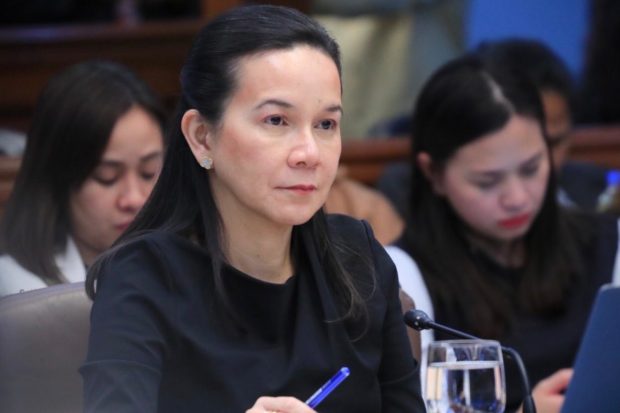Poe to Malacañang: Listen to appeal of rice farmers, hog raisers

Senator Grace Poe during one of the Senate hearings. Photo from the office of Sen. Poe
MANILA, Philippines—Senator Grace Poe implored Malacañang to heed the agriculture sector’s call on not lowering the tariffs on rice and pork which could open the floodgates for imports that could further discourage local production.
A decrease in tariff could ultimately benefit rice exporting countries such as India, Pakistan, and China.
“African swine fever [ASF] wiped out pig farms in most of Luzon with big conglomerates now stepping back. How will local production recover if we flood the market with imports without the necessary assurance that pork and pork products that are sold in the market are free of the disease?” said Poe in a statement Wednesday.
Poe also hit the Department of Agriculture for its handling of the ASF that has reached Visayas and for not listening to the farmers and hog raisers’ pleas.
She added that it was the DA that petitioned the Tariff Commission (TC) to lower the levy on pork and rice imports on February 4.
Article continues after this advertisementThe DA did not present or explain why tariffs should be lowered and it was the Department of Finance that attempted to justify why levy on rice imports should be lowered.
Article continues after this advertisement“It is unsettling to see the DOF advocating a cut in tariffs especially now when it has been relying on borrowings for its spending as tax collection is down. Hog raisers have been begging to keep the existing tariff structure as lowering it will only ensure bigger profits for importers and lower collection for government. It is baffling to see both the DA and the DOF pushing for moves contrary to their mandates,” said Poe.
DA, however, said that its draft executive order on the pork and rice tariffs was already sent to Malacañang and awaits the signature of President Rodrigo Duterte.
The proposal means to lower the tariffs on rice imports to 35 percent from the current 40% rate for those brought in under the minimum access volume (MAV) mechanism and 50% for rice shipments shipped in outside the MAV.
Tariff on pork imports, meanwhile, will be lowered to 5% from the current 30% for those brought in under the MAV and 40% from outside the MAV.
The TC’s initial assessment showed that the average price of rice from India and Pakistan in the country is already lower than that of grain from Vietnam and Thailand despite the higher tariffs on rice imports from non-ASEAN countries.
Poe ultimately questioned the DA’s motive in lowering the tariff even though the country is already expecting a bumper harvest soon.
“Bababa ba ang presyo ng bigas para sa mga kababayan nating inuutang na ang pambili nito makakain lang? Is depressing palay prices the objective because lower palay prices do not always result in lower rice prices for consumers? Kasama sa pangako nang ipinasa ang Rice Tariffication Law na bababa ang presyo ng bigas. Simula nang iniba ang papel ng NFA [National Food Administration], nawala na rin ang P29 per kilo na bigas. Asan na ‘yung sinasabi noong murang bigas? Nung nawala na sa merkado ang NFA, nawala na rin ang murang bigas. Sino ba ang pinakikita ng DA dito?” said Poe.
(Will the price of rice go down for our countrymen who go in debt just to find the money to buy them for their meals? Is depressing palay prices the objective because lower palay prices do not always result in lower rice prices for consumers? Part of the promise of the Rice Tariffication Law was to lower the price of rice. Ever since the NFA’s papers were passed down, the P29-per-kilo price of rice was also gone. Where’s the promise of cheaper rice? When NFA rice was taken out of the market, cheap rice was also gone. Who is profiting from DA’s efforts here?)